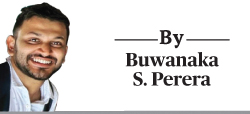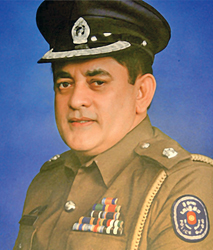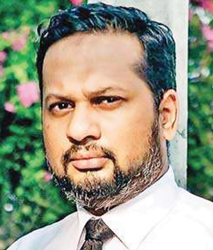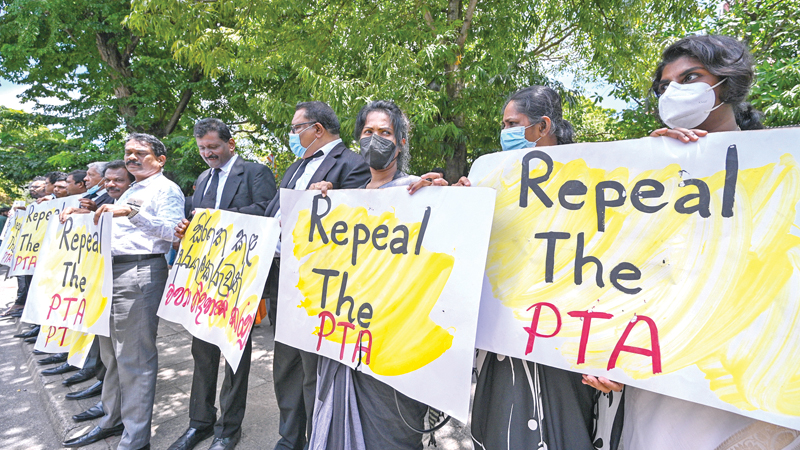 “I just want my son to be able to continue his studies and get back to his normal life,” said Riffai (52), father of Suhail, the 21-year-old aviation student who was arrested and detained under the Prevention of Terrorism Act (PTA) for allegedly sharing anti-Israeli sentiments on social media. On Tuesday (15), Suhail was released on bail after spending nine months in detention.
“I just want my son to be able to continue his studies and get back to his normal life,” said Riffai (52), father of Suhail, the 21-year-old aviation student who was arrested and detained under the Prevention of Terrorism Act (PTA) for allegedly sharing anti-Israeli sentiments on social media. On Tuesday (15), Suhail was released on bail after spending nine months in detention.
His story sparked widespread debate among politicians and the public after Riffai took to social media earlier this year to highlight his son’s plight. Suhail’s alleged crime was expressing his right to free speech and dissent, criticising a foreign nation accused of war crimes.
In a world where Israel’s actions during the conflict have become one of the most polarising global issues, and millions, including many in Sri Lanka, have openly condemned the occupying Israeli Army, why was Suhail singled out and arrested under one of the country’s most draconian laws?
The Sunday Observer spoke to his family, legal experts, and activists to examine how the PTA continues to be used in ways that compromise the fundamental rights of Sri Lankan citizens.
The arrest

ASP F. U. Wootler
Suhail borrowed around Rs. 1,500 in cash from his father and travelled from Mawanella to Colombo on October 23 last year to inspect a boarding house at Dehiwala. Later that evening, officers from the Dehiwala Police Station arrested him, citing his failure to produce identification. He was produced before the Mount Lavinia Magistrate the following day and released after his NIC was presented to court.
However, when Suhail and his father had returned to their home in Mawanella, the Dehiwala Police OIC and other officers had already arrived there and insisted that Suhail return to Dehiwala to provide a statement.
Riffai requested that the statement be recorded at the Mawanella Police Station, saying that there was no need to return to Dehiwala. Despite his protests, the Mawanella Police OIC had assured Riffai that Suhail would be brought home safely the morning of the 25. That was the last time Suhail left home for the next nine months. On the 27, he was remanded under the PTA.
“When my son was produced before the magistrate for the second time, the judge asked how the Police could re-arrest someone she had already ordered been released. The Police said they found anti-Israeli content on his phone, specifically a video allegedly showing Suhail trampling an Israeli flag, which they deemed as a security threat.
When the judge asked for the phone to be handed over to the court, they said it had already been given to the Criminal Investigation Department. The judge asked how they did that without a court order,” said Riffai adding that that despite the magistrate’s repeated requests to produce the phone, the Police simply responded with, “no response from the CID.”

Hejaaz Hizbullah
This month, the Police told court that they lacked sufficient evidence to justify Suhail’s continued detention and recommended bail. But the Mount Lavinia Magistrate rejected the request, saying that the court had no authority to grant bail under the PTA. She expressed her dissatisfaction at the detention without evidence and questioned how the Police could arrest someone under the PTA while being unaware that bail could not be granted by the court. She instructed the Police to get advice from the Attorney General on how to proceed.
During Suhail’s nine-month detention in remand prison, he missed his graduation and, according to Riffai, was denied “vital medication.”
He has been on medication for anxiety since the age of 12. He said that despite presenting the Police with all his medical records, they did not permit him to access the medication that “helps him to get about his day-to-day life.” “Now that he’s out, I’ve taken him to a doctor again, and I hope he’ll feel better soon,” says Riffai.
He also said that while several rights groups and legal experts had raised serious concerns over Suhail’s prolonged detention, and despite interventions by the Human Rights Commission of Sri Lanka (HRCSL), his son’s arrest came at a politically charged moment. He feared that during the General Election period, his son’s case would be turned into a political bargaining chip.
“I’m a poor man. I had to mortgage my house and went into debt over the past few months because of all this. All I ask is for the Government to deliver justice to my son,” said Riffai.
When the Sunday Observer asked Deputy Minister of Public Security Sunil Watagala about the arrest, he said that Suhail’s parents had praised law enforcement and added that Suhail should be rehabilitated.
Riffai denied this, saying that neither he nor Suhail’s mother made any such comments.
Responding to questions on the lack of formal charges against Suhail, Acting Police Media Spokesperson ASP Fredric Wootler said, “The Criminal Investigation Department has examined a significant number of his documents and analysed his phone records. However, I am not in a position to disclose those findings at this time.”
Lawyer and human rights defender Hejaaz Hizbullah told the Sunday Observer that citizens of Sri Lanka are entitled to their opinions and show dissent in a peaceful manner and that the alleged forms of dissent Suhail has been charged under were not the first time such an incident had occurred.
Referring to the anti-Indian protest Movements in the late 1980s, where Indian flags were set on fire, and to Norwegian flags being set on fire in front of the Norway Embassy during the civil war by MPs, Hizbullah questioned the grounds on which this particular incident was a deciding factor for the PTA to be used.
Hizbullah expressed concern over the use of the PTA, questioning why it was being invoked to protect the interests of a foreign nation.
He said that while Sri Lanka had not applied its regular laws to Israeli nationals, whom he accused of operating illegal businesses, threatening locals, and violating immigration laws, the Government had instead resorted to the PTA to shield their sentiments. “This is worrying,” he said.
He said that the use and exploitation of the PTA is evident, in this incident, as Suhail’s story made headlines, and the police found it difficult to detain him any longer.
On the question of the future of the PTA, Hizbullah said that the current social trajectory and dialogue don’t look very positive and that it is not politically popular to get rid of an anti-terror law.
“Sri Lanka needs an anti-terror law. The PTA was introduced four years after armed groups started operating in this country. In the past six years, we have had no terrorism related incident, but the PTA has been exercised against innocent citizens like Suhail and Wasantha Mudalige,” said Hizbullah.
He said that even the Easter Sunday Commission had pointed out that it wasn’t a shortage of legal instruments, such as the PTA, that made the Easter Sunday attacks possible, but rather the State’s inability and failure in applying the penal code when and where necessary.








